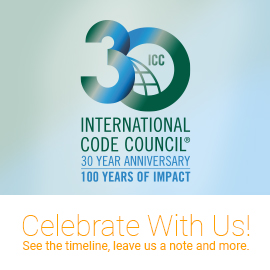
Advocating for the sustainable management of freshwater resources on World Water Day
![]() Water is essential for the survival and productivity of all life and ecosystems. For decades, the International Code Council’s codes and standards have addressed water-related issues and we remain committed to working with member jurisdictions and industry partners to bring water-efficient products to market, labeling new homes and structures as more water-efficient, and spreading the word about the need for smart water use.
Water is essential for the survival and productivity of all life and ecosystems. For decades, the International Code Council’s codes and standards have addressed water-related issues and we remain committed to working with member jurisdictions and industry partners to bring water-efficient products to market, labeling new homes and structures as more water-efficient, and spreading the word about the need for smart water use.
The Code Council family of solutions has several resources available to assist jurisdictions, manufacturers and the public with water conservation and efficiency. To ensure your community is using the latest codes with the latest water conservation and efficiency best practices, please visit our Water Conservation & Efficiency page to learn more information on water as it relates to International Codes and standards.
The Code Council has a partnership with the Residential Energy Services Network (RESNET) in the development of the Water Efficiency Rating Index, which establishes a system to rate a home’s efficiency in water use. The Code Council also is a partner in the U.S. Environmental Protection Agency’s WaterSense program. Products and services that earn the WaterSense label with the ICC Evaluation Service (ICC-ES) certification mark are certified to be at least 20 percent more water-efficient without sacrificing performance.
Each year, World Water Day celebrates water and raises awareness of the global water crisis, and a core focus of the observance is to support the achievement of Sustainable Development Goal (SDG) 6: water and sanitation for all by 2030. The day is used to advocate for the sustainable management of freshwater resources. World Water Day 2021 (March 22) is about what water means to people, its true value and how we can better protect this vital resource. Water means different things to different people. The value of water is about much more than its price — water has enormous and complex value for our households, food, culture, health, education, economics and the integrity of our natural environment. If we overlook any of these values, we risk mismanaging this finite, irreplaceable resource.
Although 70 percent of our planet is covered with water, less than one percent is drinkable. Events such as the water crisis in Flint, Mich., and the drought in the Western United States shine the spotlight on a growing global issue. At the end of 2020, the Alliance for National and Community Resilience released the third of its Community Resilience Benchmarks — the water benchmark — which addresses resilience of drinking water, wastewater and stormwater systems. Learn more by reading the Code Council news release: New community benchmark on water infrastructure resilience released and check out our Everyone Needs Water Infographic.





